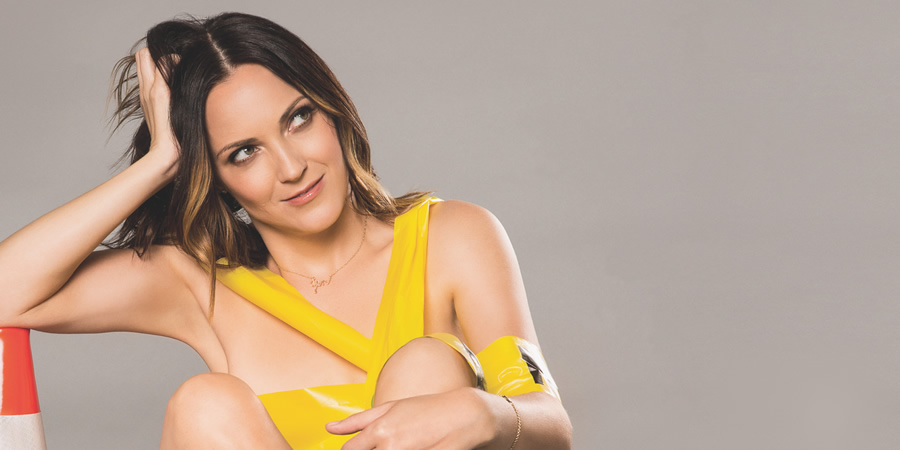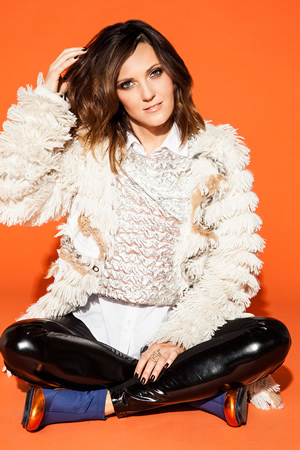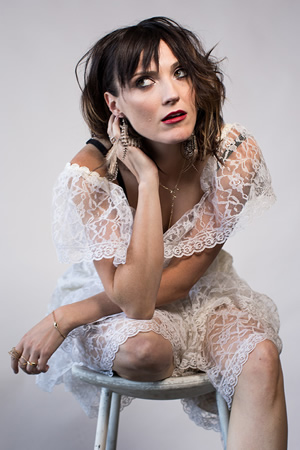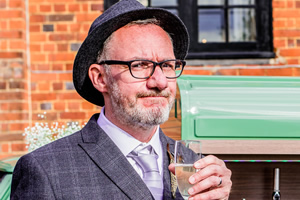Jen Kirkman interview

Now becoming a popular fixture at the Soho Theatre, Jen Kirkman has tied another string to her bow since her UK-breakthrough run in 2013 (or however you attach a string to a bow. Glue? Hooks? Who knows?). The Boston-born currently LA-based comic is now a well-established author too, having hit the best-seller list that same year with her self-explanatory book I Can Barely Take Care Of Myself: Tales of a Happy Life Without Kids.
Now there's a follow-up, continuing that fertile theme, which she'll be signing-and-selling during her latest Soho run: I Know What I'm Doing and Other Lies I Tell Myself (Dispatches From a Life Under Construction).
Kirkman's life seems to be constructed pretty solidly, in truth: as well as the books, albums and Netflix special, she's probably best known as one of the long-term writers on Chelsea Handler's round-table discussion show Chelsea Lately, while also popping up on numerous other big-time talk shows and as a narrator on the US version of Drunk History.
Style-wise - and though she'd probably scoff at the epic comparison - there's a big hint of Joan Rivers about Kirkman onstage, partly due to the pleasingly smoky, slightly croaky voice, but also a vanity-free approach to real-life revelations. She may insist during our chat below that "I'm not that frank", but there's definitely a feeling that nothing's off-limits. These stories could go anywhere.
What made you want to get into stand-up?
Comedy was the last thing in the performing world that I wanted to get into. If you asked me this question at age five I would tell you that I was going to be a tap dancer when I grew up. Age eight I was gearing up to be a child star with my own sitcom. Spoiler: that didn't happen. Age 14 I wanted to be a poet and move to New York City to pursue a life of wearing black turtlenecks and smoking cigarettes. Age 17 I wanted to be a ballerina - also a job that allows wearing all black and smoking cigarettes. I went to college to study modern dance and serious drama - and that's what my college degree is in.
Were there any comics that inspired you?
Although I always loved comedy and watched stand-up comedians on TV - who didn't? - I had no idea that's what I would end up doing. I had no desire to be a comedian. I've always had the desire to express myself artistically. I think stand-ups are developed over time in their childhood based on the type of personality they have - and for me, and many others, it wasn't because I was a funny kid - I was weird, not that funny.
I was obsessed at a young age with not having a normal job with a normal schedule. Sadly, when I started doing open mics as a stand-up comic, at age 22 in 1997, I had to have a day job, behind a desk.

When did you shift from the dancing dream to comedy?
It was from my good friend Jackie telling me that I was funny. I knew that I was funny to her but I didn't think that meant more than I could make Jackie laugh. I got into an improv group in college and I realised that I liked doing comedy. I was a snob who wanted to be taken seriously by doing plays. But I realised you can be taken seriously and get laughs. Now I see the best way to talk about serious things is with humour.
But I realised in that improv troupe that I wanted to be getting laughs on my own. I still didn't think I could do stand-up.
How did it happen?
When I went to see stand-up comedy live at a club for the first time, I fell in love with what I saw. It doesn't matter who it was - it could have been anyone, I knew that I felt different than the rest of the audience who were just content to sit there and laugh. I felt impatient. I felt like "I need to be doing this. I'm gonna have to figure out how." And within five minutes I was no longer having fun watching stand-up. I was jealous, tortured, and so inspired that I almost felt hopeless. That's the moment I became a stand-up comic. Oh, and I don't smoke anymore, and I wear colours other than black.
Where did you start gigging, and how did those early shows go?
I don't want to bore anyone reading who might already know, so I'll just say quickly I started in 1997 in the back of a bar and another place that was a room above a Chinese restaurant in Boston, Massachusetts. The other comics and I performed for other twenty-something's and it was a loving, positive, 'easy to make other people laugh who were just like me' environment. I got lucky. And it helped me become totally delusional for a while about how 'good' I was.
Was your style then anything like it is now?
My style when I first started is VERY similar to how I am now. It came naturally to me. That doesn't mean I was a fully formed comic - I wasn't. My style is that I talk - a lot. I seem like I'm telling stories off of the top of my head but I'm delivering solid, continuous jokes in a narrative, not one-liner style. If that makes any sense - and if it doesn't, that's fine too.
Anyway, after I moved to New York City I took some advice from a guy who worked at Comedy Central and he told me that I should try to change my style. He said that one-liner jokes were really the new trend. I tried to deliver my act that way for years - and I was bombing so terribly it really set me back for a while. I finally realised that guy has no idea what he's talking about and telling someone to change their style is like telling someone to change their hair colour. It doesn't always look good on you.
Was there one moment that made you think - 'actually, this risky career move might just work out?'
I thought this delusional thought from THE SECOND I got on stage for the first time. I was convinced that within one month I would have my own off-Broadway show. When I started actually getting TV gigs I had more humility and the thoughts quickly change to, "This could be the last paid TV gig I have. I better keep working even harder."
You're pretty frank about your life onstage - do you run it past the people involved beforehand?
I'm not that frank. But it just seems like I am because most "normal" people - non-comedians - don't get on stage and say things about their life. Even at the office it would be pretty weird to stand-up and announce, "I have a fear of death!" I never make fun of other people in my act. I mention that other people exist - but the stories are usually about how I am an idiot or bad person or how wrong I was one time.
I make fun of my mom a little bit but it's from such a place of love - and I have to keep reminding her that for sure. She seems to take it better if she's in the room and I tell the audience that she's there and they cheer. When she gets the glory she doesn't mind when I point out funny things she's said that she never meant to be funny - or public.
Have you ever killed a great bit because it was too revealing?
I would never, ever talk about things that could make anyone else feel badly or reveal their personal lives. Trust me, it wouldn't be that funny. I would look really mean if I got up on stage and talked about my brother and how he's got money problems, is never going to make it as a magician, and only dates women who mother him. I don't have a brother and that's all made up - but see how awful that sounded to read that before I said that I made that all up? It wouldn't be funny to sell my non-existent brother out like that on stage.

Your latest Netflix special is great - what sort of stuff will you be talking about at the Soho Theatre?
I'm doing a special show that's based on the theme of my new book called I Know What I'm Doing & Other Lies I Tell Myself. The stories in the show are not in the book but the theme - of really going after certain things in life thinking they'll be the magic fix - is what this show is about.
I am doing something different this time and it's much more of a storytelling show than stand-up. And the stories are ridiculous tales of my early days - ruining a talent show as a kid, my childhood fear of nuclear war, taking a course to conquer my fear of flying as a teenager and making a fool of myself at the graduation, learning how to break up with people in my twenties, going to therapy, and finally what my life is like now as someone who meditates but still has road rage. It's a fun show.
Is it a bit weird having a special on Netflix - do you find yourself checking the 'star' ratings, and what Netflix recommends you watch after your show (yesterday: Orange Is The New Black)? Or could that drive you crazy?
No, not at all! I love having my special on Netflix. Sometimes I'll just sit on my couch and think, "Maybe someone in Norway is watching my special right now!" I never check the star rating because it doesn't mean anything. I put that material to rest when the special aired, I don't need any more feedback on it. It's there for people to love or hate. I already got paid and there's nothing more for me to obsess over.
One thing I am very proud of is that I have heard that many TV shows and movies end with a recommendation to watch my special and that just means that my material is relatable, and covers a lot of territory. If I had listened to that idiot at Comedy Central who told me to do 'one liner' jokes - I wouldn't have had the kind of success I've had at appealing to so many different people.
It's a crazy world. Do you ever get the urge to go more overtly political?
Nope. For me, the personal is the political and I get too frustrated trying to express it online or anywhere. I don't do political jokes because they don't age well and you can't tour with them and I just don't feel like it.
But are there certain comedians hoping that Trump gets in, just for the material?
No. There is not one person who wants Trump to get in for material. No one wants the world to end for comedy.
Finally, any interesting new projects on the horizon? Or crazy plans for the future?
The same as always - gearing up to tape a new special - I can't say who it's with yet, they won't let me - and just to keep touring, and being a comedian. Which I guess is a pretty crazy plan.
Jen Kirkman is at the Soho Theatre from Mon 18th to Sat 23rd July, for tickets visit SohoTheatre.com
Help us publish more great content by becoming a BCG Supporter. You'll be backing our mission to champion, celebrate and promote British comedy in all its forms: past, present and future.
We understand times are tough, but if you believe in the power of laughter we'd be honoured to have you join us. Advertising doesn't cover our costs, so every single donation matters and is put to good use. Thank you.
Love comedy? Find out more
